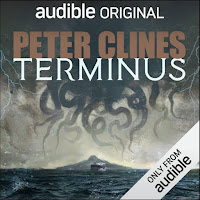What’s that? How does this relate to genre rant, you ask? I mean, Pulp Fiction clearly isn’t a genre movie. Not in that sci-fi/fantasy sense, anyway.
 Except… well, do you remember the mysterious briefcase that floats through the story? The one with something bright and glowing inside of it, something we never see. There are a lot of theories out there about what’s in the briefcase, but one of the more interesting ones is that it’s Marsellus Wallace’s soul. He made a deal with the devil as a young man and now he’s made a new deal to get it back. Jules and Vincent, you see, are the go-betweens who are getting the soul from Satan’s reps (Brett and his two partners). This is why the briefcase’s combination is 666 and why everyone is stunned by the beauty of the thing in the case—it’s a pure, innocent soul. It also explain why the bad guys can’t hit Vince and Jules—it really is divine protection.
Except… well, do you remember the mysterious briefcase that floats through the story? The one with something bright and glowing inside of it, something we never see. There are a lot of theories out there about what’s in the briefcase, but one of the more interesting ones is that it’s Marsellus Wallace’s soul. He made a deal with the devil as a young man and now he’s made a new deal to get it back. Jules and Vincent, you see, are the go-betweens who are getting the soul from Satan’s reps (Brett and his two partners). This is why the briefcase’s combination is 666 and why everyone is stunned by the beauty of the thing in the case—it’s a pure, innocent soul. It also explain why the bad guys can’t hit Vince and Jules—it really is divine protection.And if the movie’s got this spiritual/magic element to it now—souls and the devil and actual divine protection—well… isn’t this a gritty urban fantasy movie? I mean, that’s pretty close to the definition of urban fantasy. Maybe supernatural crime or supernatural noir, if we want to give a more flavorful description.
So the answer to the above question about “what would be different” is, of course, nothing. Again, the thing in the briefcase is just a MacGuffin. It could contain a human soul, a gold brick, a Tron ID disc, absolutely anything… and it wouldn’t change the plot in the slightest. Because it isn’t actually interacting with anything in a meaningful way. We can make an argument the briefcase is, but whatever’s inside it is… irrelevant.
Which is the problem I wanted to talk about. Some folks have a bad habit of using a single element of a book or movie to justify bumping it into a new genre. I’ve talked about this a couple times with superpowers stories that try to call themselves superhero stories, and the problems that can cause. Just because someone’s using a sword doesn’t make my story high fantasy or historical fiction. Setting it ten years in the future doesn’t automatically mean it’s sci-fi. And just because there might be a soul in that briefcase doesn’t make Pulp Fiction urban fantasy.
And yeah, it’s really tempting when comedies are sellingto say “Why, yes, my manuscript Terminus contains several laughs and completely reads as a comedy.” But this almost always works against me. Sure, sometimes a reader will say “this isn’t what I expected at all but I ended up loving it anyway…” but those times are few and far between.
Until then, go write.




